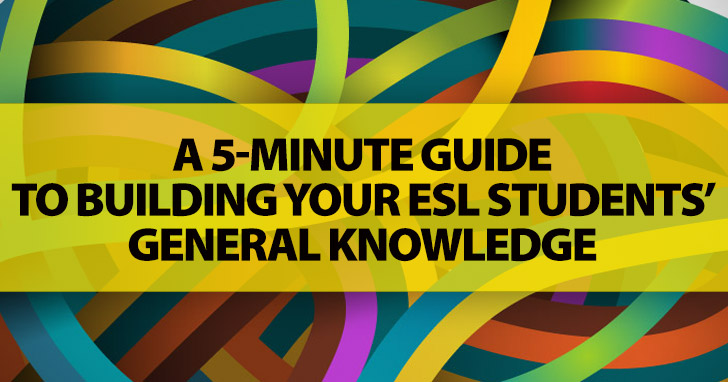
The ESL classroom is as great a place for new knowledge about the world as it is for practicing language.
I find that almost every topic we cover has a factual element, and that often, students are missing some important background information. Facts, figures, names and dates can all be covered in a fun way which doesn’t feel like an academic exercise.
Often, this information isn’t taught, but checked. A good reason to check the names of the countries, people, ethnicities and languages we encounter in the classroom is that the students’ own L1 word may be very different from the word in English. There are exceptions; in Bahasa Indonesia, for example, words for countries are transliterated so that they’re very close to the English word. However, in Chinese, such transliteration obscures the English word by assembling Chinese characters to produce a sound which only roughly approximates the original name.
The same can be true for the names of movies, famous people, historical events, oceans and mountains, planets and moons, and almost any other lexical group which connects to our knowledge of the facts of the world. Ensuring that our students both know these facts, and can pronounce the relevant words, leads to an expanded general knowledge and also a greater confidence in self-expression.

Know Before You Teach
Teachers build up a repository of useful facts as their careers progress, and I’d like to encourage you to keep this information handy in a file which you regularly review. It really engenders confidence in a teacher if they’re able to produce relevant facts – capitals, the names of inventors, the winner of an important sports championship, the leaders of major countries or companies – and students’ focus and discipline improves when they perceive their teacher to be well-prepared and knowledgeable.
Wikipedia is a great source for quick ‘cheat sheets’ of such information; I recently found it very useful for my Business English class to have at hand a list of the world’s top 20 companies by market share and number of employees, for example, or the biggest producers of oil and electricity. Students respond well to these facts, and I’ve noticed repeatedly how they feel a sense of progress, measured not only by improvements in language ability, but more simply and immediately by knowing something at 10:30 which they did not know at 9:00.
Consider Building in Fact-Checking
There are limitless opportunities to quickly quiz your students on the facts of the modern world. Here are some genuine examples from my own classroom, where fact-checking has become so routine that the students arrive armed with the facts of an issue, whether or not they believe I’ll call on them.
Example 1: Preparing for a reading on the history of Islam
| Teacher: | So, who can tell me some countries where most people are Muslim? |
| Students: | Saudi Arabia / Afghanistan / Iraq / Indonesia |
| Teacher: | Good, those are all correct. What about Africa? |
| Student 1: | Nigeria? |
| Teacher: | Yes, I think about half of Nigerians are Muslim... and? |
| Student 2: | Somalia? |
| Teacher: | Good job! Now, if I told you that Christianity was the world’s most commonly practiced religion, where on the list would you say Islam might be? |
| Students: | [pondering, some querying of each other] |
| Teacher: | Well, what about Buddhism? Could that be second on the list? |
| Student 3: | No enough Buddhist. Maybe is Islam? |
| Teacher: | You think Islam is the second most practiced religion in the world? |
| Students: | Yeah / Sounds right. |
| Teacher: | That’s true. Tell me about the holy places of Islam. |
| Student 3: | What is holy places? |
| Teacher: | [Open gesture to the class.] Help me out, guys? |
| Student 4: | Important places, like churches or the mos... how we say? |
| Student 5: | Mosque. Like ‘mask’ but with ‘o’. |
| Students: | [Laughter] |
| Teacher to Student 3: | So, what about Islam’s holy places? |
| Student 3: | In Arabia, right? |
| Student 1: | Mecca! |
| Student 2: | Every Muslim must go one time in the life. |
| Teacher: | Good! And who are the important people in Islam. Is there a God? |
| Students: | Yes! |
| Student 3: | Is Allah. |
| Student 5: | But Allah... God... Same same? |
| Teacher: | I think you’re on the right track there. |
***
Short brainstorms like this produce a lot of vocabulary, in this case, the names of Muslim countries. The other facts are checked as a group, so that the students effectively teach each other the material.
Example 2: Preparing to Debate ‘History’s Most Important Invention’
| Teacher: | OK, you’ve told me the Internet is the most important invention of the 20th century, but you still haven’t told me who invented it. |
| Student 1: | It wasn’t invented. It just is. |
| Teacher: | What, it just appeared by magic, one day? |
| Students: | [Laughter] |
| Student 1: | It wasn’t just one person. Everyone created it. |
| Teacher: | Interesting! What do you think of that, gang? |
| Student 2: | It’s the idea of the internet which was invented. All the websites and everything, we made that. But the idea was an invention. |
| Teacher: | I agree! But whose? |
| Student 3: | Army? |
| Teacher: | How do you mean, Gao? |
| Student 3: | Was maybe an army invent. For communicating. |
| Teacher: | You may be onto something there. Guys, do me a favor – Google this word. [Writes DARPA on the whiteboard.] Anyone heard of it before? |
| Student 4: | Is like CIA. |
| Teacher: | A little bit, I guess. What kind of work do they do? |
| Student 1: | Defense research. Did they invent Internet? |
| Student 2: | [Quotes part of the Wikipedia article, establishing DARPA’s role.] |
| Student 4: | But that was the military internet. Not for EBay or Facebook. |
| Students: | [Laughter] |
| Teacher: | That’s right. So, I ask again... Who invented the Internet? Check out who invented HTML, and that might help. [Writes HTML on the whiteboard.] |
| Student 3: | [After a pause for research]. Tim Berners-Lee? |
| Student 2: | Who? |
| Teacher: | You got it! Write down this man’s name, guys. He deserves to be much more famous. |
***
The students have produced vocabulary relating to modern computer inventions, and equally importantly, have the chance to metabolize a difficult but important name.

Include Other General Knowledge Situations
-
1
Geography
Countries, capitals, neighboring countries; products a country is famous for.
-
2
History
In which century did this event happen? Was this event before or after that one?
-
3
Records
Which is the tallest / fastest / oldest / most valuable, etc.?
-
4
Time
How long ago did this happen? How long did this project take?
-
5
Culture
Names of artists, writers, Oscar winners etc; artistic controversies; famous works.
I believe that it’s healthy – and not scary or intimidating – to bounce facts and figures around the classroom as a routine part of learning new material.
Once made routine, the pinning down of facts becomes an agent of learning; everyone’s interested in gaining new information, and by doing so, students think through and produce a greater volume of language.
P.S. If you enjoyed this article, please help spread it by clicking one of those sharing buttons below. And if you are interested in more, you should follow our Facebook page where we share more about creative, non-boring ways to teach English.







